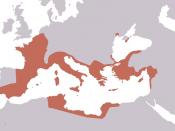Julius Caesar
Julius Caesar's actions undermined the Republic and paved the way for a system headed by Emperors.
From 100B.C to 44B.C Gaius Julius Caesar had accomplished more than any other great leader of Rome. Remarkably, coming from an old, impoverished Patrician family he rose through the ranks of the Roman Senate mainly through connections to his allies, Pompey and Crassus. Eventually, becoming the first dictator in Rome to serve for life. Fellow Senators, who did not approve of the 'Empire' like state Rome was regaining, conspired to and did assassinate him.
Julius Caesar, from a young age showed impeccable determination, sensibility, and a very practical and strong-minded attitude. These characteristics contributed greatly to the vast arrangement of titles he received within the Roman Senate. The Julians' were relatively connected to the Marians, as Caesar's aunt was married to Gaius Marius. This connection along with marrying Cornelia, daughter of Marian associate, Cinna, led Caesar directly into politics.
In 69B.C he was elected Quaestor and 'after surviving Sulla's proscriptions, Caesar rose quickly as a popularis maintaining his identity as a Marian'. (Nelson, 2002:99)
As Aedile in 65B.C he borrowed and spent money from Marcus Lucinius Crassus, a wealthy, dominant politic, producing elaborate games and functions.
By doing this for the public, he gained much popularity and achieved post of Pontifex Maximus (High Priest) in 63B.C.
Simultaneously in 61B.C, Julius was sent to serve as Governor in Spain. However, Rome on the other hand, was being controlled by the Optimates (opposition of Marian side) fighting for appeasement with Pompey and Crassus.
Against the Optimates in 60B.C, Caesar returned to Rome, reconciled Pompey and Crassus, and conjoined them and himself to a sealed oath of cooperation, called the First Triumvirate.
'The arrangement, called by modern historians as the First Triumvirate, was entirely private,


